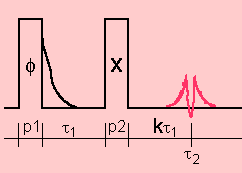Introduction to MQMAS NMR
AIM: Optimization of the echo or antiecho amplitudes for either the shifted-echo or the split-t1 MQMAS sequences where the first pulse excites a p-quantum coherence only. The powder sample is in a rotor spinning at the magic angle.

The multi-quantum magic-angle spinning (MQMAS) experiment on half-integer quadrupole spin was introduced by L. Frydman and co-workers. It is an echo experiment involving transitions between non-consecutive energy levels during the excitation of the spin system by the first pulse. The MQ coherences generated by this pulse are converted back to -1Q coherence as an echo and an antiecho by the second pulse. Mainly the central-transition signal is detected.
The echo and the anti-echo amplitudes are a product of two functions: the MQ excitation function A(p1) that depends on p1 and the conversion function B(p2) that depends on p2. The observation of the echo and antiecho requires the optimization of the two pulse-lengths p1 and p2.
The optimization procedure is a two-step experiment, where the delay k*tau1 allows the observation of the whole echo signal (However, the signal acquisition starts at the position tau2 = k*tau1):
In the first experiment, we keep constant p1 and acquire a series of spectra for increasing p2.
In the second experiment, we acquire a series of spectra for increasing p1, where p2 corresponds to that generating the highest spectrum line intensity in the first experiment.
